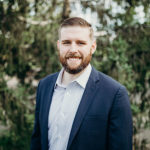Almost 13 years ago, I sat in a crowded auditorium in Chicago and heard for the first time about the devastation caused by HIV/AIDS in sub-Saharan Africa. At the time, what struck me more than the enormity of the epidemic was the absence of the Church on the front lines of the fight to heal and restore those who were suffering.
HIV is indiscriminate in its path of destruction—and so should we be in our compassion.
Nine months after I sat in that auditorium, I was on a plane to Kenya. Armed with a camera and a team of friends, I had set out to see firsthand how AIDS was affecting people and churches in East Africa. Throughout that first trip to Kenya I met hundreds of people who put flesh and blood around the idea I had of an abstract epidemic. The trip changed the trajectory of my life. My Kenyan guides on that trip became my co-founders, and together we started an organization called CARE for AIDS that now serves over 4,000 HIV+ adults each year, all through local churches.
In the early years of CARE for AIDS, as I sought to educate and raise funds from American churches to support our cause, I found myself recounting stories of many of our clients who were infected by their unfaithful husbands—stories of women who were innocent and suffering, clients who had no agency in how they contracted the virus. These cases obviously pull on the compassion of all people, evangelical or not.
Let us not relegate the responsibility of caring for the most vulnerable to the secular institutions of the world.
But I have found that by only broadcasting stories like this, I have been withholding an incredible opportunity for evangelicals to live out their faith. HIV is indiscriminate in its path of destruction. Innocent wives and children infected at birth, as well as sex workers and unfaithful husbands. This virus cuts across all levels of morality, economic status, gender, and tribe. HIV is indiscriminate, and how much more indiscriminate should we be in our compassion? [SB2] The truth is, no matter how someone contracted the virus, we are called as Christians to care for them. Yes, we proclaim the truth about sin and its consequences. At the same time, we care for those suffering in this fallen world.
How the American Church can respond
With over 1.7 million new infections each year and nearly half of those occurring in Eastern and Southern Africa, HIV is not an issue that we can ever ignore. As the Church, we have an opportunity to work toward an end to HIV in this generation and bring the love, care, and good news of Christ to those who are suffering.
CARE for AIDS’ mission is to empower people to live a life beyond AIDS, and we’ve developed a strategy that is doing just that. It’s a relatively simple concept but by no means easy. Through 65+ church partners in East Africa and 180+ full-time national staff, we invite the most vulnerable people living with HIV/AIDS into our centers, which are based in local churches. We journey with our clients as we provide them with critical services to stabilize their often dire situations and empower them for long-term success. We do this by addressing needs in five key areas: physical, spiritual, emotional, social, and economic.
On Dec. 1, World AIDS Day, and beyond, I would like to invite the Church, both individually and institutionally, to think about her role in the continued fight against HIV/AIDS. Consider how you and your church can be gloriously indiscriminate in how you exercise compassion. Will you join us by:
- Praying for those affected by HIV and those on the front lines of the response
- Educating yourself (and your congregation) on the reality of HIV/AIDS
- Partnering with CARE for AIDS or another organization to directly care for those affected
Let us not relegate the responsibility of caring for the most vulnerable to the secular institutions of the world. As the Church, let’s take up the leadership and work toward an end to this epidemic. As a result, lives will be saved, eternities transformed, and God will be glorified.
To learn more about the story of CARE for AIDS, please visit careforaids.org and read the new book by the co-founders called Beyond Blood: Hope and Humanity in the Forgotten Fight against AIDS.










